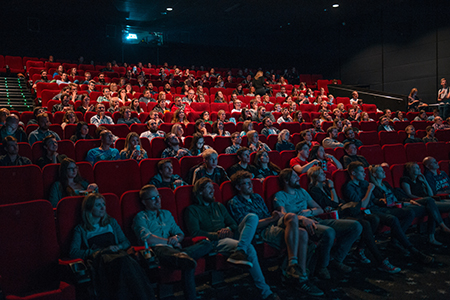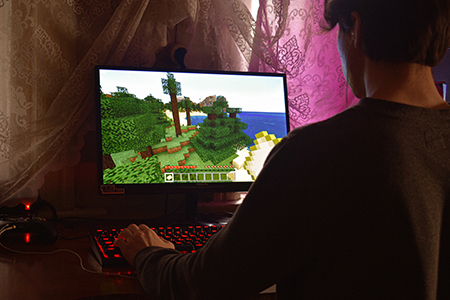A generation ago, the media most households consumed consisted of radio, television, newspapers, books and magazines. Today, as technology advances rapidly, our homes are filled instead with music and television streaming services, online video games, virtual and augmented reality, smartphone apps, podcasts and a plethora of social media.
These forms of “new media” – which refers to any media delivered digitally – have become commonplace in society almost overnight. But what challenges and opportunities do these new media forms present, for the Church and for society as a whole?
It’s helpful to begin with some contextual information.
In the world of television streaming services, Netflix, Amazon Prime, Fetch TV, AppleTV+, Disney+, Foxtel, Stan and YouTube Premium allow subscribers to access a massive range of popular content. At the end of May 2020, more than 15.7 million Australians had access to a subscription television service. [i]
When it comes to music streaming services, recent figures showed more than 12.7 million Australians use Spotify, YouTube Music, Apple Music, SoundCloud or the like.[ii]
The one that flies under the radar somewhat is the video game industry. Worldwide, the video game market was worth more than US$396 billion in 2023[iii], with the largest region for gamers being the Asia Pacific region, with almost 1.8 billion gamers.[iv]
The numbers make it clear that these forms of new media are well entrenched in Australian homes. But how do we go about using them without making them the centre of our lives? Are parents aware of the content being streamed, downloaded and accessed in their homes; in their children’s bedrooms; in their cars? And are they equipped with the knowledge to be able to manage the challenges new media presents?
All of these questions require individual reflection and careful discernment. The Australian Catholic Bishops’ Social Justice Statement 2019-20 provides a helpful starting point, highlighting a number of the challenges digital media presents and encouraging individuals to “build online neighbourhoods ordered towards genuine human encounter”.
“People of all generations hunger for friendship and genuine human encounter because we are made for community. Our digital world enables us to be more connected than ever before, but sadly it can also be a place of manipulation, exploitation and violence. This too calls us to active citizenship because, at their heart, these problems are not technological, but rather moral. We can choose how we behave online, and we can collectively shape the online world, building a more just and loving online neighbourhood.”
Bishop Terence Brady, Making it real: Genuine human encounter in our digital world.
Thankfully, there are some within the Church, locally and abroad, who are game enough (pardon the pun) to tackle the challenges new media presents. Sydney’s Peter Holmes, a gaming expert and a father of eight children, has written and spoken extensively about video games and morality from a Catholic perspective.
Other creative geniuses have tackled new media directly, by creating faith-based alternatives. Rather than subscribing to Netflix or Stan, Catholics might consider watching on-demand video content provided by platforms like EWTN, FORMED, Shalom World, Parousia Media or the Parramatta Diocese’s The Well. There are also Christian-based services, such as Pure Flix, Angel Studios, Christian Cinema and Minno.
These individuals and organisations have indeed followed the encouragement of Pope Francis, who has said:
“Let us boldly become citizens of the digital world. The Church needs to be concerned for, and present in, the world of communication, in order to dialogue with people today and to help them encounter Christ…
“The revolution taking place in communications media and in information technologies represents a great and thrilling challenge; may we respond to that challenge with fresh energy and imagination as we seek to share with others the beauty of God.”
Message of Pope Francis for the 48th World Communications Day.
Arguably the best example of an honourable citizen of the digital world is Blessed Carlo Acutis, a video game enthusiast and computer genius of the 21st century. In his post-synodal Apostolic Exhortation, Christus Vivit, Pope Francis says:
 “Carlo was well aware that the whole apparatus of communications, advertising and social networking can be used to lull us, to make us addicted to consumerism and buying the latest thing on the market, obsessed with our free time, caught up in negativity. Yet he knew how to use the new communications technology to transmit the Gospel, to communicate values and beauty.
“Carlo was well aware that the whole apparatus of communications, advertising and social networking can be used to lull us, to make us addicted to consumerism and buying the latest thing on the market, obsessed with our free time, caught up in negativity. Yet he knew how to use the new communications technology to transmit the Gospel, to communicate values and beauty.
“Carlo didn’t fall into the trap. He saw that many young people, wanting to be different, really end up being like everyone else, running after whatever the powerful set before them with the mechanisms of consumerism and distraction. In this way they do not bring forth the gifts the Lord has given them; they do not offer the world those unique personal talents that God has given to each of them. As a result, Carlo said, “everyone is born as an original, but many people end up dying as photocopies”. Don’t let that happen to you!”
Christus Vivit, 2019.
So while the rise of new media forms presents a range of challenges, it also presents significant opportunities for the Church to evangelise the world. Technology allows the message of the Gospel to reach a global audience, immediately and without excessive cost. With so many people spending hours each day online, digital media has become arguably the most important mechanism of evangelisation. Pope Emeritus Benedict XVI alluded to this fact several years ago, in his Message for the 47th World Communications Day, saying:
“The challenge facing social networks is how to be truly inclusive: thus they will benefit from the full participation of believers who desire to share the message of Jesus and the values of human dignity which his teaching promotes. Believers are increasingly aware that, unless the Good News is made known also in the digital world, it may be absent in the experience of many people for whom this existential space is important.”
Message of Pope Benedict XVI for the 47th World Communications Day.
In 2020 the National Centre for Evangelisation (NCE) took on the responsibilities of the Office for Film and Broadcasting, which produced movie reviews over many years, providing readers with insightful and helpful guides to navigate their way through cinematic releases.
In continuing this good work, the NCE will reflect upon video games, popular streaming service content and other new media. Such reflections will assist the Church in understanding the realm of new media and to be better informed of practical ways to navigate the challenges and opportunities they present.
[1] http://www.roymorgan.com/findings/8472-subscription-pay-tv-services-may-2020-202007200704
[2] http://www.roymorgan.com/findings/8424-music-streaming-services-march-2020-202006010642
[3] https://www.statista.com/statistics/292056/video-game-market-value-worldwide/
[4] https://www.statista.com/chart/30559/number-of-video-game-players-by-region/










